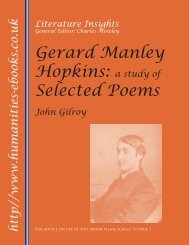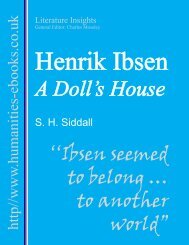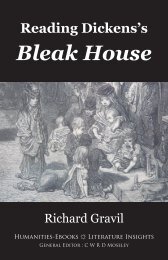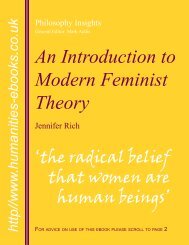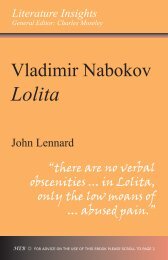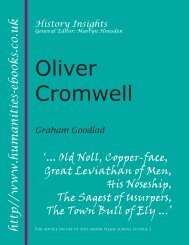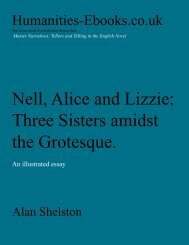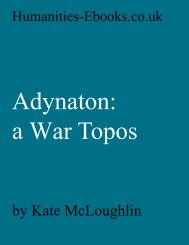Mathilda - Who Knew Too Much - Humanities-Ebooks
Mathilda - Who Knew Too Much - Humanities-Ebooks
Mathilda - Who Knew Too Much - Humanities-Ebooks
Create successful ePaper yourself
Turn your PDF publications into a flip-book with our unique Google optimized e-Paper software.
<strong>Humanities</strong>-<strong>Ebooks</strong><br />
A micro-ebook from Master Narratives<br />
<strong>Mathilda</strong> –<br />
<strong>Who</strong> <strong>Knew</strong> <strong>Too</strong> <strong>Much</strong><br />
Frederick Burwick
Publication Data<br />
© Frederick Burwick, 2001, 2007<br />
The author has asserted his right to be identified as the author of this<br />
Work in accordance with the Copyright, Designs and Patents Act 1988.<br />
First edition of Master Narratives published in 2001 by Ashgate Publishing<br />
Limited. Second electronic edition published in 2007 by <strong>Humanities</strong>-<br />
<strong>Ebooks</strong> LLP, Tirril Hall, Tirril, Penrith CA10 2JE.<br />
Reading Options<br />
* To use the navigation tools, the search facility, and other features of<br />
the Adobe toolbar, this Ebook should be read in default view.<br />
* To navigate through the contents use the pages panel at the left of<br />
the screen.<br />
* To search, expand the search column at the right of the screen or<br />
click on the binocular symbol in the toolbar.<br />
* For ease of reading, use to enlarge the page to full<br />
screen<br />
* Use to return to the full menu.<br />
Licence and permissions<br />
This book is licensed for a particular computer or computers. The file<br />
itself may be copied, but the copy will not open until the new user obtains<br />
a licence from the <strong>Humanities</strong>-<strong>Ebooks</strong> website in the usual manner. The<br />
original purchaser may license the same work for a second computer by<br />
applying to support@humanities-ebooks.co.uk with proof of purchase.<br />
Permissions: it is permissible to print sections of the book (in draft mode)<br />
for your own use, but not to copy and paste text.<br />
This essay is also available as part of the volume Master Narratives:<br />
Tellers and Telling in the English Novel, ISBN 979-1-84760-007-3.
Contents of Master Narratives: Tellers and Telling<br />
in the English Novel, ed. Richard Gravil<br />
1 Richard Gravil – Introduction (7)<br />
2 W. B. Hutchings – How pleasant to meet Mr Fielding: The Narrator as<br />
Hero in Tom Jones (18)<br />
3 Jayne Lewis – ‘Where then lies the difference?’: The (Ante)<br />
Postmodernity of Tristram Shandy (33)<br />
4 Mary Wedd – Old Mortality: Editor and Narrator (54)<br />
[not available separately]<br />
5 Frederick Burwick – <strong>Mathilda</strong> – <strong>Who</strong> <strong>Knew</strong> <strong>Too</strong> <strong>Much</strong> (68)<br />
6 Jane Stabler – ‘Perswasion’ in Persuasion (82)<br />
7 Frederick Burwick – Wuthering Heights as Bifurcated Novel (101)<br />
8 Richard Gravil – Negotiating Mary Barton (126)<br />
9 Alan Shelston – Nell, Alice and Lizzie: Three Sisters amidst the<br />
Grotesque (148)<br />
10 Richard Gravil – The Androgyny of Bleak House (173)<br />
11 Nicola Trott – Middlemarch and ‘the Home Epic’ (198)<br />
12 Gerard Barrett – The Ghost of Doubt: Writing, Speech and Language<br />
in Lord Jim (233)<br />
13 Michael O’Neill – Liking or Disliking: Woolf, Conrad, Lawrence (249)<br />
Page numbers of the text in this micro-ebook correspond to those in the electronic<br />
edition as listed above.
Chapter 5<br />
<strong>Mathilda</strong> – <strong>Who</strong> <strong>Knew</strong> <strong>Too</strong> <strong>Much</strong><br />
Frederick Burwick<br />
In August, 1819, while Percy Bysshe Shelley was finishing The Cenci (1819),<br />
a drama of a daughter’s rape and subsequent revenge against her brutal and<br />
tyrannical father, Mary Shelley began writing The Fields of Fancy, later to be<br />
titled <strong>Mathilda</strong> (1819). 1 In this first-person narrative, a young woman tells the<br />
story of her relationship with her father. When Mary Shelley completed the<br />
novel, she sent it to her father, William Godwin, who was supposed to submit it<br />
to a publisher. He not only refused to submit it, he blocked any further attempt<br />
at publication by declining to return it to her. 2 The novel remained unpublished<br />
until 1959 when it was edited by Elizabeth Nitchie from the manuscript in the<br />
1. The Journals of Mary Shelley, 1814–1844, 2 vols, ed. Paula Feldman and Diana<br />
Scott-Kilvert. (Oxford: Clarendon, 1987), 1: 294. On 4 August 1819 (Percy Bysshe<br />
Shelley’s 27th birthday), Mary Shelley (6 months pregnant) put the reminder to<br />
herself to ‘Write’ alongside the entry ‘S. writes the Cenci’. Subsequent entries repeat<br />
the same instruction, ‘Write’. Shelley finished a final draft of Cenci on 8 August<br />
1819; Mary Shelley writes: ‘he finishes his tragedy’.<br />
2. The Letters of Mary Wollstonecraft Shelley, 3 vols, ed. Betty T. Bennett. (Baltimore:<br />
The Johns Hopkins University Press, 1980), 1: 215. To Maria Gisborne (18 January<br />
1822): ‘Now you are in England, we have some hope of hearing really something about<br />
his literary affairs – I hear that he is talked of. The Cenci most – I hope Charles the Ist<br />
which is now on the anvil, will raise his reputation. … Do you remember what I wrote<br />
about <strong>Mathilda</strong>[?]’ (The Gisbornes had delivered the novel to Godwin in May 1820,<br />
but he rejected their further intercession in regard to the novel.) Maria Gisborne and<br />
Edward E. Williams, Shelley’s Friends, Their Journals and Letters, ed. Frederick Jones<br />
(Norma: University of Oklahoma Press, 1951), 76: Maria Gisborne to Mary Shelley<br />
(9 February 1822): ‘With regard to <strong>Mathilda</strong> (another impediment), as your father has<br />
put a stop to all intercourse between us, I am at a lost at what step to take.’



